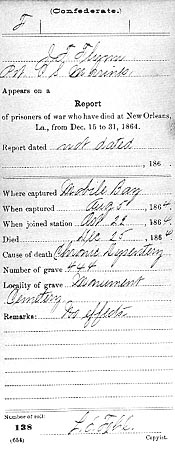Inhalt dieser Seite: Andere Dokumente des CSMC (Briefe, ...)
Inhalt:
- Briefe
- Briefe Ruffin Thomas
- Briefe und Nachlass Lt. Fowler, CSMC
- Parol/Entlassungsdokument Lt. Doak, CSMC - Tafel in C
- Registrierung als POV (Prisoner of War) Pvt. J. F. Flynn of the Confederate States Marines
--------------------------------------------------------------------------------------------------------------------------------------------------------------------------------------------------------------------------
- Unterschrift:
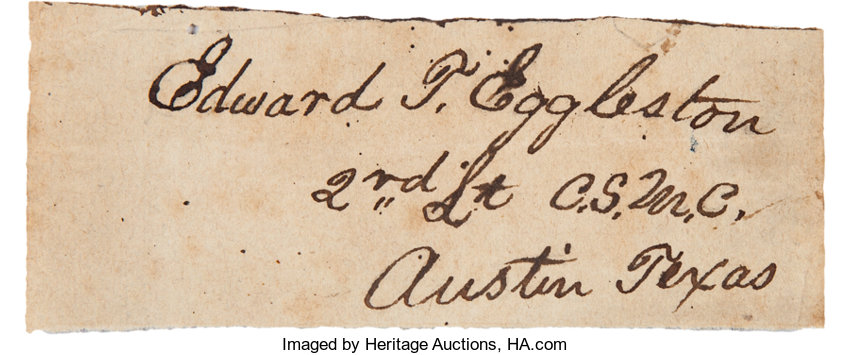
Cut Signature of Confederate Marine Corps Officer. Cut signature inscribed: "Edward T. Eggleston/ 2nd Lt C.S.M.C./ Austin, Texas". Excised from the marbled endpaper of a book likely owned by Eggleston.
- Briefe: (Es sind 9 Briefe von CS Marines bekannt, 4 davon von Lt. Crenshaw)
2. Ltd Ruffin Thomas "Death of a black servant":
4 December 1862: “Dear Pa, It has become my painful duty to inform you of Preston’s death.”
Item description: Letter, 4 December 1862, from Ruffin Thomson, 18th Mississippi Infantry Regiment, to his “Pa” (William H. Thomson). In the letter, Thomson informs his father of the death of his slave, Preston (“Press”).
More about Ruffin Thomson:
Ruffin Thomson was the oldest child and only son of William H. Thomson and Hannah Lavinia Thomson. He studied at the University of Mississippi and the University of North Carolina, leaving school in 1861 to enter the Confederate Army, serving as a private until February 1864, when he was commissioned a second lieutenant in the Confederate Marine Corps. After the Civil War, he studied medicine in New Orleans and began a practice in Hinds County. In 1873, he married Fanny Potter. In 1888, he went to Fort Simcoe, Washington Territory, as clerk to the Yakima Indian Agency, hoping to recover his failing health, but instead died soon after his arrival.
11th April 1863
Item Citation: Letter dated 11April 1863, from folder 6 in the Ruffin Thomson Papers #3315, Southern Historical Collection, Wilson Library, University of North Carolina at Chapel Hill.
Item Transcription:
The duties of a marine officer are similar to those of the infantry. In fact, regular marines are sharp shooters on board ship. As yet they are employed to man heavy batteries defending the principal seacoast cities. I feel competent to fill the position.Fredericksburg, Va.,
April 11th, 1863Dear Pa,
The last I received from you came by Hester. It is gratifying indeed to know that you all continue in health and prosperity. It leaves me free from that bane of many a gallant soldier – the thought of home going to ruin and property destroyed. It is cheering, too, to perceive the growing self-reliance and confidence of the Southwest, ’tis there that most troublesome enemy is to be met and overcome. Here every thing is safe. Hooker does not seem to know what to do. All the known routes to Richmond have been tried, and certain destruction awaits him on any of them. To remain Idle during good weather is equally dangerous. Before this can possibly reach you operations will have begun – one or the other party must take the offensive. The giant mind of Lee is even now, I confidently believe, moulding plans of attack, should Hooker fail to advance, and his 9 months men be permitted to retire from the field. A very few days will determine the character of the campaign.
You say that everything has donned the emerald livery of spring. How different it is with us. It was only the other day we had quite a fall of snow. There is nothing green- the buds are beginning to swell, and the martins appeared day before yesterday. What a difference! Give me a home among the hills of middle Mississippi in preference to all the lands I have yet seen.
Charlie Hester could not get the cake and wine though. Someone stole the wine, and the cake becoming damaged, they ate it. Carrying articles of that kind in hand in very burdensome, as I know from experience.
A short time since I wrote you a hasty note on the subject of my appointment as midshipman. I had just learned from the Senator Brown that appointments were made under the age of 18 – this of course leaves me out, so I wrote you to that effect, in order that you might not waste your time in trying to attain an unattainable object. Senator Brown also informed me that the marine corps was incomplete, and would advise me to apply for the office of lieutenant of marines; said if I would draw up an application to the President direct, over my own signature, get the endorsement of my officers, and send it to him, that he would attend to it for me. Seemed to think that there was every prospect of success. I did as directed. Capt. Brown’s recommendation was flattering in the extreme. I handed it next to Ccl. L, Who being engaged at the time, said he would attend to it. In a few days I called to him to know his action in the matter. He informed that he had forwarded it. And he the explained to me that he would subject himself to a court martial by letting an application go to Richmond except through the channels prescribed by an order from Gen’l Cooper, Adjutant and Inspector General. The course to be taken is as follows. Col. Law approves and sends to General Barksdale. General B. ditto to Gen’l Kershaw (temporary Division Commander) – Gen’l McLaws ditto to Gen’l Lee who forwards to Richmond. Should any one of the generals disapprove, the document goes no further, and is returned by the same route to Capt. Brown, whence it started. If it is successful, the information is conveyed in like manner. As soon as I became aware of this, I wrote to Brown, detailing the circumstances. This document started on its errand about two weeks ago, and I’ve not heard of it since, and the inference is that it has received the sanction of the generals above named, or – it has been overlooked at some of the offices through which it had to pass. Hope bids me be of good cheer – my judgment forces upon me the latter interpretation. We will await later developments.
My general health is good, but I’ve had a cough for more than a week which distresses me at times. It is not continuous, but comes on by spells, and is so violent that it almost causes me to vomit. These spells do not last long, and do not seem to be consequent upon exertion, but come at irregular intervals. The discharge of phlegm is small. I apprehend no danger from it – warm weather will doubtless make it all right.
My love to all –
Your son
Ruffin Thomson
And Miss Gina Bracey is married? She got the best of the bargain, think you?
- See more at: http://blogs.lib.unc.edu/civilwar/index.php/page/54/#sthash.cNhshZV4.dpuf
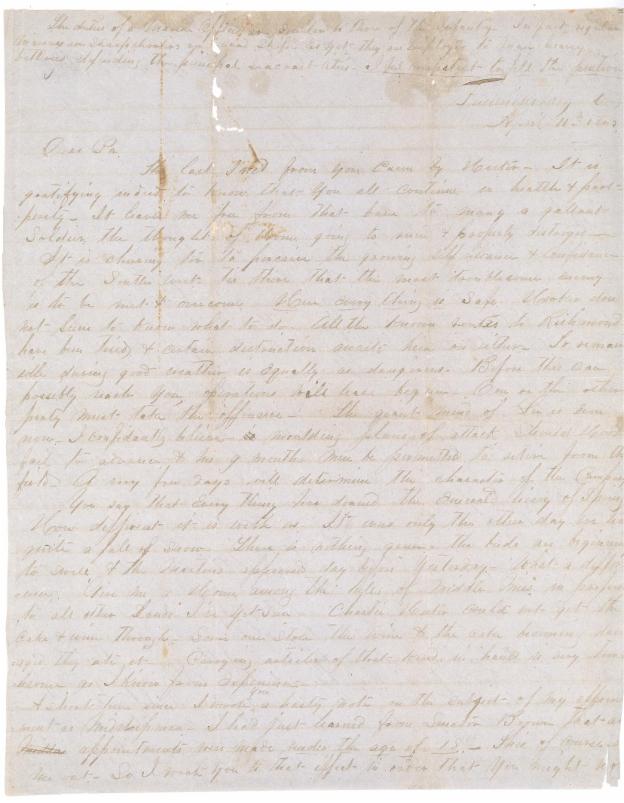
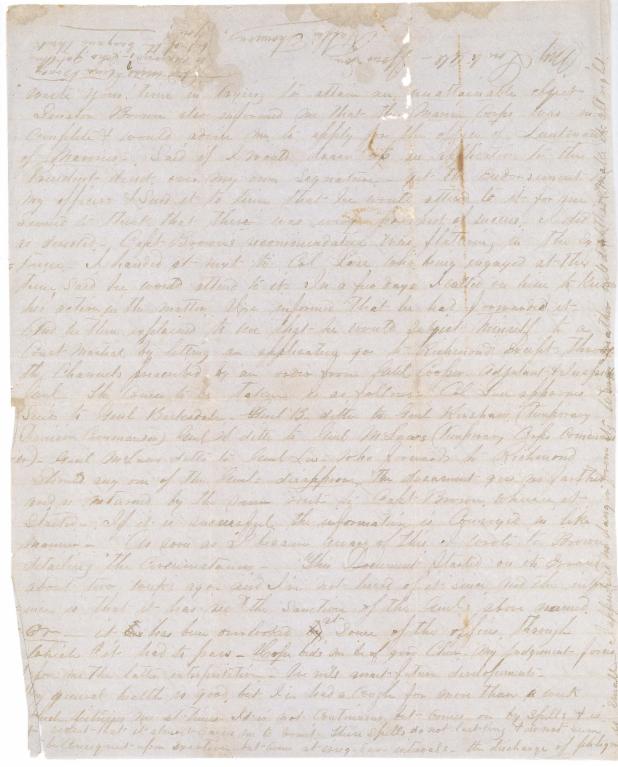
Alle Ruffin Thomas Briefe findet Ihr unter: Ruffin Thomas und alles aus dem Nachlass unter Ruffin Thomas folders recht weit unten auf der Seite.
Letter from Capt. Meiere:
Confederate States Marine Corps (CSMC) covers are extremely scarce. I have recorded only nine CSMC covers over a 30 plus year period. Interestingly, four of the nine known CSMC covers are addressed to Lieutenant Edward Crenshaw, CSMC.
The above cover, addressed to Captain J. Ernest Meiere at Mobile, Alabama, is an excellent example of a CSMC cover. It has a 10 cent blue Scott #11 stamp with a Richmond, Virginia, July 24 (1864) cancellation. The address contains the wording, "C. S. Marine Corps." Of the nine known covers, only two have such wording with the remaining seven citing either, "C.S.M.C" or no reference to the CSMC at all. The covers that do not reference the CSMC were documented as CSMC covers by researching the name of the addressee.
Captain Julius Ernest Meiere was appointed a Second Lieutenant in the United States Marine Corps (USMC) on April 15, 1855. In May 1861, he attempted to resign from the USMC in order to serve the Confederate States of America, but his resignation was refused and he was dismissed. Shortly thereafter, he was appointed a First Lieutenant in the CSMC. In December 1861, he was promoted to Captain. He had a variety of assignments including serving on board the CSS Virginia when she was abandoned and destroyed on May 11, 1862. He was captured at the surrender of Fort Gaines, Alabama, on August 8, 1864 and was imprisoned at New Orleans, Louisiana, but managed to escape on October 13, 1864. He continued to serve in the CSMC but finally surrendered at Mobile, Alabama, on May 4, 1865. After the war, Captain Meiere went north to attend the Medical College of the University of New York where he graduated in 1869. He died at Cripple Creek, Colorado in 1905 at the age of72. Keep a sharp lookout for a CSMC cover. It would be a real nice addition to your collection.
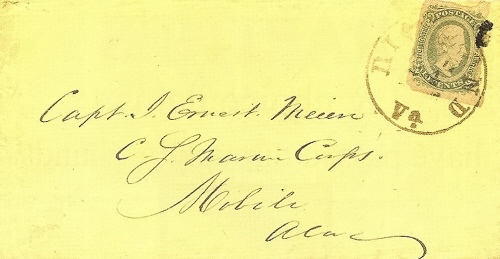
R Y Fendall
Confederate Marine POW Cover from
Previously Unknown New Orleans Prison
The cover featured in this article was sold in March, 1983 as Lot #697 in Robert G. Kaufmann's Sale No. 27. It was described simply as a POW cover from New Orleans with a notation that "Antrim recorded 3 covers from New Orleans. My bid was not adequate to acquire the cover. A couple years ago, the same cover was offered in a Schuyler Rumsey sale with more or less the same wording, although now reporting 11 covers known from New Orleans. There was still no indication of which prison James R. Y. Fendall was held! I decided to investigate further.
In the Broadfoot listing in Winston-Salem Library's North Carolina Room, I found a James R. Y. Fendall listed in Co H 18th Mississippi Infantry. Satisfied that this was most likely the prisoner, I started to leave the library. Before I left, however, I looked in the index to the CSA Navy Official Records. I was surprised to find in there the name James R. Y. Fendall. Why would the name of a private in the 18th Mississippi Infantry appear in the Navy 0. R. (Official records)? I turned to the appropriate volume and found a James R. Y. Fendall mentioned as a Confederate Marine. Could this be the same individual?
Back at home I consulted Ralph W. Donnelly's Biographical Sketches of the Commissioned Officers of the Confederate States Marine Corps. In that book, a remarkable story began to unfold. James Robert Young Fendall was born in 1838 or 1839, the son of Philip Richard Fendall and Elizabeth Mary Young. Fendall's father, a prominent lawyer in the Washington DC area was a first cousin of Robert E. Lee. The Lees of Virginia were not young Fendall's only famous relatives. His uncle was former Mississippi Governor Albert Gallatin Brown.
When the War Between the States broke out, Albert Gallatin Brown, a US Senator from Mississippi, resigned his Senate seat to accept a commission as a Captain in the Confederate Army. Brown's company known as "'Brown's Rebels" was mustered into service as Co H 18th Mississippi Infantry. Fendall enlisted in his uncle's unit May 20, 1861. His unit took part in the First Battle of Manassas.
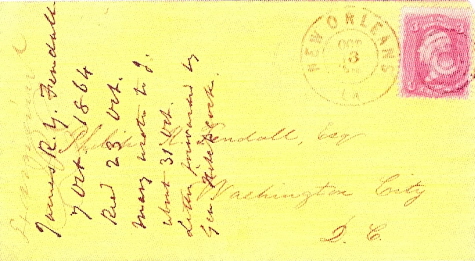
Private Henry Hunter Bowen, CS Marine Corps, CSS Columbia:
When I published my book, A Lifetime of Collecting Confederate States of America Postal History, I received a very kind and complimentary email from Colonel Wilbert T. Waters, Jr. In addition, to my surprise and delight, Colonel Waters informed me that the addressee on the above cover, which was illustrated on page 129 of my book, was a relative of his. In particular, Henry H. (Hunter) Bowen was the brother of his great-great-grandfather George Washington Bowen from Plymouth, Washington County, North Carolina.
Both Henry and George were CS Marine Corps privates on board the CSS Columbia in Charleston, South Carolina. In addition, a brother-in-law of George Bowen, George W. Oden, was also a Marine Corps private stationed on the ship. All three reported aboard together on October 6, 1864. On January 12,1865, the recently constructed ironclad ram had run on a sunken wreck off Fort Moultrie and was severely damaged. When the Union forces took possession of Charleston on February 18, 1865, they found the greatly prized CSS Columbia in jeopardy near Fort Moultrie and quickly seized her. The envelope mailed to Private Henry Hunter Bowen has a pair of 5¢ blue Scott #7 with a Tarboro, North Carolina, January 30 (1865) cancellation.
The letter arrived on the CSS Columbia after the disastrous accident but before the Federals captured the crippled ship. The Navy and Marine Corps personnel, including the three relatives, were ordered to abandon the vessel and escape to Drewry's Bluff, Virginia, to join other Navy and Marine Corps forces assembled there under the command of Commodore John R. Tucker, CS Navy. All three f the relatives survived the war. Just think. This wonderful example of Navy and Marine Corps postal history was saved and hand-carried by Private Henry Hunter Bowen from the CSS Columbia to his home in Plymouth, North Carolina. It is truly amazing the cover survived for us to appreciate 145 years later. Finally, about a half dozen envelopes are known that have been mailed to a member of the CS Marine Corps (both officer and enlisted). They are quite rare.
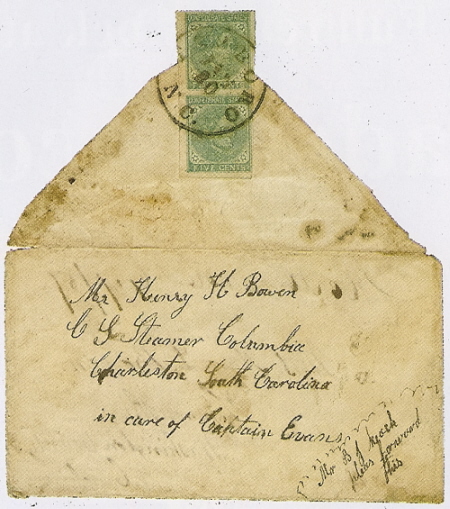
Letter from Lt. Crenshaw:
Confederate States Marine Corps, Drewry's Bluff Va. Manuscript "C.S.M.C." and "Paid" straightline on blue cover to Lieut. Edward Crenshaw at Drewery's Bluff Va., back with pencil "Receipt for Money Paid", with original two-page letter from Private Joseph Jones datelined "C.S. Str. Tallahassee, Wilmington N.C. Oct. 29th, 1864", missing one backflap, Very Fine and extremely rare Confederate Marine Corps cover and letter, accompanied by extensive biographical information on Crenshaw and a 1962 Confederate Philatelist article discussing a similar cover, which was at that time reported to be the first Marine Corps cover known
(link: Lot 2083)
Confederacy, Confederate States Marine Corps. Blue cover with "Paid" handstamp addressed to Lieut. Edward Crenshaw C.S.M.C. (Confederate States Marine Corps), Drewry's Bluff Va., original letter datelined "C.S. Str. Tallahassee, Wilmington NC Oct 19th, 1864" sent by Private Joseph S. Jones C.S.M.C. thanking the Lieut. for helping him get paid; no flap, Very Fine and rare.
Estimate; $1,000 - 1,500.
Lieut. Crenshaw was the commander of the C.S. marine contingent on the CSS Tallahassee before transferring to Drewrys Bluff in early October 1863. Drewrys Bluff Va. was the headquarters for the CS Marines. The Confederate States Marine Corps was a very small service with an authorized strength of only 1,026 enlisted men and 65 officers. However, the Corps never approached its full authorized strength. The main duties of the CSMC were to act as guards at naval stations, man shore defenses, and serve on CS warships. Some CS marines also served late in the war with the famed Naval Brigade attached to the Confederate Army. Private Jones was later captured at Fort Fisher on Jan. 1st 1865 and confined as POW at Point Lookout
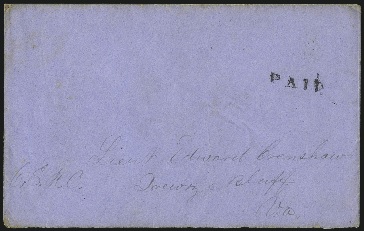
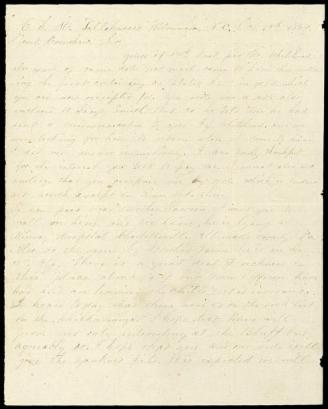
Briefe und Nachlass Lt. Fowler:
Lt. John Douglas Fowler, 4th AlaVI, CSMC, the only Confederate Marine officer to die while on active duty. Includes The Book of Common Prayer... According to the Use of the Protestant Episcopal Church.... Boston: C. Stimson, Jr. 4to, full leather boards, gilt spine, marbled endpapers. 1838. Second free end paper has inked inscription: Merrimac Cabin in one hand, and Lt. John Douglas Fowler / Confederate Marine Corps. / Officer on Ram Merrimac / Died while Commanding / Marine Corps at / Drery's [sic] Bluff, Va. / Drove back the Federal / Gunboat "Galena" / & saved Richmond / from Genl. Butler's / fleet of Gunboats. / in 1862. in another. Inside ffep: Property of Val. Taylor, Uniontown, Ala., This Book was given to me by Aunt Fannie Fowler, wife of Theo. G. Fowler, brother of John Douglas Fowler - V(?) Fowler, and This is one of most highly prized possessions I have. PLUS ALS, 16pp, 8 x 10". "Rapid Ann [Rapidan] Station," Culpeper City, Aug. 24, 1861. Addressed to Mrs. M.E. Terrell [Fowler's older brother Theo.'s mother-in-law]. This letter was partially transcribed in an article about Fowler by David M. Sullivan, in Civil War Times Illustrated, Feb. 1988. AND a cdv of Fowler with backmark of Bogardus, New York.
John Douglas Fowler was born in Virginia to a middle class family. Hard times hit, and John moved with his brothers to Alabama, where opportunities appeared better. As war broke out, he enlisted in Co. D of the 4th Alabama Infantry, the "Canebrake Rifle Guards," and was sworn into service April 25, 1861.
After a period of training and engagement in small skirmishes, they saw their first major battle. The 4th Ala. was assigned to Johnson's force at Winchester, but received orders to evacuate. From Fowler's letter: [T]he general impression was that we were falling back on Manassas to avoid a fight with Patterson, but we were not long left in doubt.... Beauregard notified Johnson ...that he had fought and won a battle that day with a loss to the enemy of over eight hundred, but that the enemy was collecting in large force with the intention of giving him battle, also, that he (Beauregard) thought he could hold his position for forty-eight hours, and ... hoped that Johnson might be able to join him in that time. Johnson informed them that this would be a forced march, traversing 36 miles of mountainous country without rest, after which they waited in rain at Piedmont station for a train to carry them to Manassas Junction, ...arriving there at 9 O'clock. We...bivouacked about half way between Bull run and the Junction, in a fine piece of woods. It fell to my lot to be on duty Saturday night as Corporal of the guard, as all of the Corporals were Sick, or broke down.
He describes the start of the battle: I was just finishing my breakfast, (a Slice of Shoulder broiled on the coals, and two hard crackers, washed down with a good drink of branch water) when they fired thir first gun (Cannon) at half past Six. Our regiment was immediately ordered to form, which we did in quick time, and then our gallant and lamented Bee rode in front of us and in a clear trumpet like voice gave the command, "right face" "forward march" to which we responded with a "hurrah," and off we marched in quick time, in the direction of the firing of the "Yankee" guns, in high Spirits and the now good prospect of Seeing a live Yankee with a musket in his hand.
He vividly describes the fury of the battle after arriving in the vicinity: We only remained here a few minutes as it was obvious that it was not his intention to attack us at this point..., we could see the "rascals" filing up to Bull run on the north Side. We then Knew that it was their intention to outflank us on our left and then commenced a desperate race between the "Yankee rascals" and ourselves, they striving to outflank us and we, as determindly [sic] Striving to prevent them. On, On, we Sped, nothing checking Speed through woods and briarfields, up and down hills, across branches and creeks, even fences fifteen rails high did not Stop us, for with one Shove we would level them with the ground - and on we'd go, mad with delight, "as it were" with the music of the Cannon, and the rattle of the Small arms, that were firing on our right.
As they emerged onto the battlefield, ...we came in full view of our hated foe, and with one accord, there was sent up by the boys of the 4th Such a yell of concentrated hatred and defiance, that it was heard for more than a mile distinctly above the roar of battle. He then describes the Union position, on a small rise overlooking the field, with a wooded area on their left wing through which reinforcements continued to pour in. Their unit was ordered to advance on the wooded area, where they met the 2nd Mississippi, and were eventually stopped by a fenceline. As they lay down at the fence, ...Bee rode up and asked, "What regiment is this"? "4th Ala was the reply" "up 4th Ala, was his response," and it was the last order I ever heard the noble fellow give. [Barnard Elliott Bee is often credited with conferring General Jackson's sobriquet "Stonewall" on him. Bee was mortally wounded just as the tide was turning in favor of his army, dying the following day in the cabin he made his headquarters near the battlefield.]
Still in the "honeymoon" stage of the war, the 4th Ala. envisioned their fight as being ...for the ladies we had left "behind us." ... Whenever I Saw one of the Scoundrels fall, ...my wish will have been fulfilled, viz: that for every tear this war has caused our Southern ladies to Shed on their protectors, might cancel the debt, by exacting one quart of blood from the heart of a rascally yankee.... Nobly did Alabama prove to the world, on that day, that her Sons were fit representatives of their brave and Shivalrous Sires.
He then describes an encounter in which there was some confusion as to whether the unit was friend or foe, but since they displayed a flag of truce, the 4th ignored them. The unit then began firing on the 4th, apparently not intending to give up at all, ...and we could have whipped them if Some fool had not given the command to fall back... Fowler lagged behind the retreating unit. I was determined to Send my compliments to Some particular member of this regiment in the Shape of a rifle ball. I first looked for the rascally Adjutant and found him on the ground wounded. I then looked through the lines and discovered an officer in full dress. I took deliberate aim at him,...and down came Mr. Yankee. I then Started up the hill after our regiment, loading as I went. I ...had gone Some fifty yards, when, down I came. I was struck with a minnie ball in the right thigh, about three inches below the hip bone...If you have ever been Severly Shocked by a galvanic Battery, you can form Some faint idea of how a "minnie" ball feels when it enters one's flesh, &c.
Fowler lay on the battlefield for hours until dragged to the Creek by two Yankees. He then lay by the creek for hours more before being removed to the closest hospital by a Confederate unit. There was "no room at the inn," so he spent the night out in the rain until a doctor probed the wound the following morning, pronouncing that nothing could be done surgically. Fowler was moved again that evening, but: There was no room in any of the hospitals for me. So I was put in the Ordnance department, on account, I Suppose of having lead in my leg. At least he had a sense of humor about it.
Tuesday afternoon, he was moved again, and reached Mrs. Taliaferro's at twelve o'clock in the night, and I then had my wound dressed for the first time, but thanks to providence, and a strong constitution, I will soon be myself again I hope. Much of the remainder of the letter describes the Taliaferro house, surrounding countryside, and, of course, the daughters of the house. About a month later he moved to Capt. Henry Holliday's residence, and describes his house and sisters. Ever the Southern gentleman, he described Mr. Holliday's seventeen-year-old sister, who visited periodically: I have Seen, and Known many fair and good ladies in the course of my Somewhat chequered life, but I confess, that this is the first volume of womankind, I have ever attempted to Study on So Short an acquaintance. I was captivated with the very title page; but the further I read, the more am I delighted. She Seems formed to love and to be loved.... do not infer from what I have written, that She has created in my heart a Sentiment Stronger than friendship, but could I love anyone, it would be She. No, No! My heart is now desolate and Sad, the mere wreck of its former Self, and I know of no fitter comparison than to liken it to Some classic fountain that has once poured its pure waters in a Sacred place, but now, it is dry, and dusty with the lizard and toad brooding over the Shattered marbles of love's urn. He then extolls, in similar flowery language, the meaning of "Mother," ending with a request to give his regards to various friends.
While awaiting medical attention, Fowler was one of the lucky few to meet Jefferson Davis, who came to survey the scene of the battle. Along with commending Fowler for his service, Davis offered him a position in the newly forming Marine Corps. After several weeks recovering, Fowler took him up on the offer, went to Richmond, and in late October, he was commissioned 2nd Lieut. in the C.S.M.C. He still had problems with his wound, and returned home for additional recovery time, finally reporting to the Gosport Navy Yard in March of 1862.
Fowler's duties at the Navy Yard seem to have been primarily guard duty, although he did serve a short period as recruiter until that duty was transfered to headquarters in Richmond. We can find no evidence that Lt. Fowler ever left land, but he was in charge of guarding the Confederate Navy's most secret project -- the construction of the rams and metal clad ships, including the Merrimac. The prayer book could have been given to him by someone who was directly involved with building or serving on the vessel. He does allude to the development of the new rams at the Naval yard in other published letters, but not to serving on one, although that seems to be the family history, and Confederate records are notoriously fragmentary.
Fowler's next major engagement came when the Union Navy tried to finish the war by taking Richmond by a water route, since the land approaches had failed. The Confederacy set up barriers by sinking obstacles in the James River just below the city, and where the natural bluffs at Drewry offered a perch for sharpshooters. Fowler was among the Marines posted on the bluffs. The guns mounted on the Union ships could not angle high enough to stop the sharpshooters and ultimately the fleet had to retreat to avoid further losses. Shortly after this, Fowler's wound festered again, forcing him to take leave and return home, where he ultimately succumbed at the end of August, 1862.
Condition: Condition: Letter has been taped along most folds. Light toning, scattered foxing and minor dampstains. Short margin tears, especially at bottom. Two pages have triangular pieces separated, but present. A few other chips of paper missing, affecting a couple words. Cdv has minor foxing at top, else VG+. Prayer book has separated front cover, upper spine end missing some leather, moderate wear to covers, especially corners, binding still tight. Heavy toning of free end papers, but internal leaves show only scattered foxing.
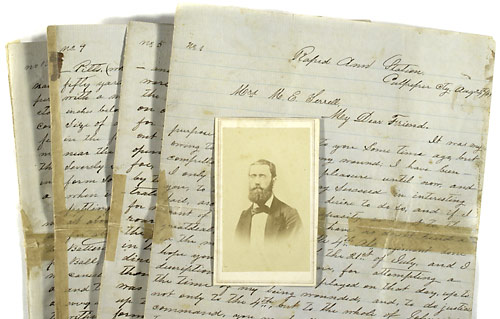
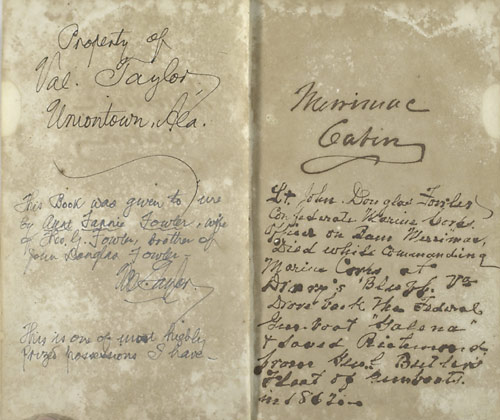
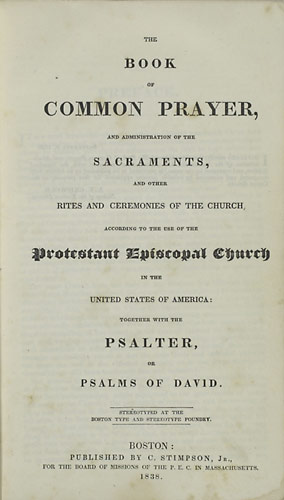
Parol / Entlassungsdokument Lt. Doak, CSMC, Appomattox:
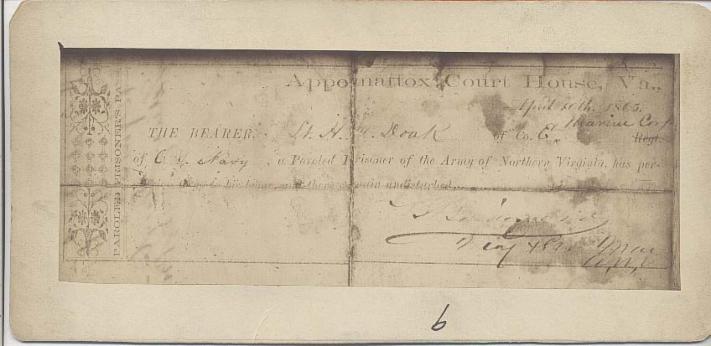
Quelle: Tennesee State Library and Archives
|
Image ID: |
26392 |
|
Subjects: |
Documents |
|
Place: |
|
|
Description: |
A signed prisoner's parole for Confederate Marine Lieutenant H. M. Doak, dated April 20, 1865, from Appomattox Court House, Virginia, giving Doak permission to travel home undisturbed. |
|
Date: |
1865 |
|
Negative: |
|
|
Collection: |
THS Picture Collection |
|
Historical Note: |
An unusual parole document for a CSA Marine officer apparently serving with Lee's Army of Northern Virginia. |
|
Series: |
|
|
Photographer: |
|
|
Engraver: |
|
|
Artist: |
|
|
Publisher: |
|
|
Format: |
Photographic print |
|
Accession No.: |
|
|
File Location: |
Box 4, Folder 36 |
A carded record for Pvt. J. F. Flynn of the Confederate States Marines.
(War Department Collection of Confederate Records, RG 109)
